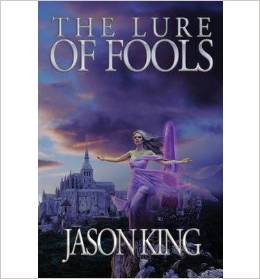1. Work your butt off.
2. Take your punches.
3. Get lucky.
Order may vary, and there may be many cycles of rinse/repeat.
1. Work your butt off.
2. Take your punches.
3. Get lucky.
Order may vary, and there may be many cycles of rinse/repeat.
A thought for you novelists out there:
“In industry after industry, the driving force behind a strong core business is a far-above average percentage of… customer advocates.” — Chris Zook, Profit from the Core
Or, as famous author Michaelbert Collings ( ;D ) once told me:
“You’re not looking for people willing to buy your books. You’re looking for people willing to sell your books.”
 The lure of fools, Jekaran’s uncle Ez warns him, is the mirage adventure. The longing for adventure draws youths from their home into danger, death, and even crime.
The lure of fools, Jekaran’s uncle Ez warns him, is the mirage adventure. The longing for adventure draws youths from their home into danger, death, and even crime.
Shortly thereafter, outlaws arrive, after Uncle Ez himself, who used to be one of their number as Argentus the Invisible Shadow. Ez shoves a magic sword into Jekaran’s hand and sends him running out of harm’s way.
Harm just doesn’t want to stay away from Jekaran too long, though. His simple job as a digger in a troupe looking for the magical mineral apeira goes south when he intervenes to save a beautiful woman from footpads. His possession of the enchanted weapon gets him in trouble with local authorities, and then worse — the woman he’s saved turns out to be an inhuman enchantress, an Allosian, on the run from her own people. She’s a thief, having snatched a pendant of illusion to disguise her flight, but at the heart of her journey is a mission of mercy: she wants to warn the humans that the Allosians, not understanding and fearing want they don’t comprehend, are coming to put all the humans to death.
The Lure of Fools is good-hearted high fantasy, in the tradition of The Sword of Shannara, only leavened with more humor. I couldn’t put it down.
Look for me at Denver Comic Con this weekend. How will you know where to find me? I’ll be at the WordFire Press booth, as usual, and specifically, I’ll be standing front of the fantastic banner, above.
Design by Kathryn Renta. Cover art and layouts by, among others, Ken Pak, Carter Reid, Nathan Shumate, and Quincy J. Allen.
 Jason Hunt is a gamer, a university athlete whose game is a lasertag-esque team shootout, with this twist: because each player sees the game through a computer headset, each athlete is seeing a different skin on the game they play together. While one sees medieval combat with crossbows, a second sees the contest in terms of pirates, and a third sees ninjas.
Jason Hunt is a gamer, a university athlete whose game is a lasertag-esque team shootout, with this twist: because each player sees the game through a computer headset, each athlete is seeing a different skin on the game they play together. While one sees medieval combat with crossbows, a second sees the contest in terms of pirates, and a third sees ninjas.
In fact, in Jason’s dark future America ruled by its Undying Emperor, everyone lives virtual lives. Most universities teach only virtual classes, athletic contests are virtual, and many people never leave their homes. Jason’s father Jay is a crank in this world, a paranoid old man who stubbornly lives off the network and teaches his son dead skills like martial arts.
Until one day, in a literal explosion, Jason’s life comes apart. The Undying Emperor, he learns, is not a benevolent immortal leading American in a long war against Alien invaders; Jay is not, after all, Jason’s dad; and the Hunt men are heirs to an old unfulfilled mission that will make Jason both hunter and hunted in his quest to overturn the order of the world: Theocracide.
You know, when I was a kid, I wanted to write fantasy novels. I read Tolkien, and then I cracked open my journal and started a story:
“Aroon!”
The old door opened.
As I recall, that was as far as I got at the time. When I was a senior in high school, I wrote a fantasy novel, an entire manuscript. As one does. Mercifully, the manuscript does not survive. I expect it was probably on the same quality level as my earlier attempt, only much longer. I also wrote short stories in high school, but then I basically stopped. I kept writing fiction, in the form of songs and screenplays, but I wrote my second novel at age 37.
So here are some things I don’t regret:
Starting Late. I look at S.A. Butler and Sarah E. Seeley and Chris Husberg, my friends starting their novelist careers in their 20s, and some part of me thinks I should be envious. Only I’m not. My career as a published novelist is coming in mid-life (unless those guys at Google Calico have their way, and I certainly hope they do — I’m a science fiction writer!), as career number three (not counting McDonald’s). That means I bring to this career things I didn’t have in my 20s: life experience, tolerance, a stronger grasp on history and language, a degree of business sophistication, negotiation and selling skills, and maybe even a little insight and wisdom. I’m okay with the trade-off.
Getting Dumped. I got dropped by my first agent. Man, that smarted. But in that pile of manure sprouted many interesting blossoms: I co-wrote with Emily and saw her career start to take off, I started self-publishing (see below), and I turned to non-fiction projects I otherwise might never have taken up. And then I got picked up by Deborah Warren, whose cheer and persistence and general approach are a much better fit for me.
Getting Rejected. I’ve had rejection letters. Lots of ’em. Form rejections. Dishonest rejections. Arrogant rejections. Once in a while, kind rejections or even helpful rejections. I’ve had multiple rejections from the same agents. I’ve had agents reject manuscripts, then subsequently offer to represent them. I’ve had agents pass on manuscripts, and then subsequently sell them. I have not enjoyed any of the rejections. But without those rejections, I wouldn’t have made any of the progress that I have.
Getting Bad Reviews. After three years, I think I’ve finally got to the point where I’ve stopped reading reviews. I’ve had some bad ones. I’ve had reviewers who didn’t finish and gave me one star. I’ve had reviewers who clearly didn’t read the book at all, and just made up rotten things to say. I expect I’ll have more of all of the above. Bring them on. That just comes with the territory.
Self-Publishing. The market out there is changing, it always has been, and it always will be. Self-publishing forced me to learn to sell, to market, to network, and to strategize in that fluid environment. As a self-published author I built a coalition of allies that continues to grow as I’m transitioning into other publishing methods. Self-publishing let me start finding an audience and show publishers that I can stand on my own two feet and pitch. It let me create a portfolio, a presence, and a brand, all of which I think has only helped me with other professionals, be they convention organizers, writers, cover artists, agents, publishers, marketers, anthologists, or whatever.
So yeah, regrets… too few to mention.
 One piece of wisdom I’ve heard at many writing conferences goes something like this: “Writing is a job. You have to treat it like a job to be successful.”
One piece of wisdom I’ve heard at many writing conferences goes something like this: “Writing is a job. You have to treat it like a job to be successful.”
But that’s wrong.
Writing is not a job. A job means somebody pays you and you show up and take orders, and 70% of us do it without engaging.
Writing is a business.
The minute you set pen to paper or open your first Word file with the hope that someone will one day pay you for your poem or story or song, you have become an entrepreneur. You are sole shareholder, chairman, and chief executive officer of the business (that picture, if you don’t recognize him, is Tim Cook; he’s a CEO). In addition to the things I said the other day about being professional, that means that you must:
It’s all up to, because you’re the owner.